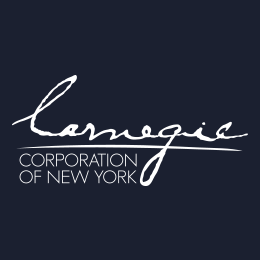Carnegie Corporation Announces Grants for Library Literacy Services, College Readiness Programs
Philanthropic foundation Carnegie Corporation of New York on December 9 announced a new $5 million pool of grant funding available for public libraries nationwide. The new initiative—Libraries as Pillars of Education and Democracy—“will help public libraries deliver critical services that promote socioeconomic mobility, civic participation, and social belonging,” according to an announcement. The $5 million will be awarded to 10 to 15 library systems in regions serving 500,000 people or more, with each system receiving up to $500,000 in funding over 24 months.
 Philanthropic foundation Carnegie Corporation of New York on December 9 announced a new $5 million pool of grant funding available for public libraries nationwide. The new initiative—Libraries as Pillars of Education and Democracy—“will help public libraries deliver critical services that promote socioeconomic mobility, civic participation, and social belonging,” according to an announcement.
Philanthropic foundation Carnegie Corporation of New York on December 9 announced a new $5 million pool of grant funding available for public libraries nationwide. The new initiative—Libraries as Pillars of Education and Democracy—“will help public libraries deliver critical services that promote socioeconomic mobility, civic participation, and social belonging,” according to an announcement.
The $5 million will be awarded to 10 to 15 library systems in regions serving 500,000 people or more, with each system receiving up to $500,000 in funding over 24 months for initiatives in two areas: English language and literacy services designed to help adults improve English language proficiency and job readiness skills; and college readiness programs designed to help teens improve academic, leadership, and civic skills and support students and their families during the transition to college. “Priority will be given to libraries in areas with growing non-English-speaking populations and/or high demand for teen college readiness services…. Libraries must demonstrate demand for services through community surveys, statistics, or other data,” according to the announcement.
Applicants must have existing, evidence-based English language learning instruction and/or college readiness programs that “are primed to increase the number of people served.” In addition, these programs must be sustainable, with the potential to increase funding support beyond the initial grant period, according to the announcement.
The first stage of the application process is a 10 to 12 minute online eligibility survey that includes a brief description of the library’s existing service that this grant would help expand and a high-level overview of their proposal. The eligibility survey is currently open and will close on January 10, 2025. Libraries selected through the eligibility survey will be invited to submit concept papers by January 31, 2025. Semifinalists will then be selected for interviews by representatives from the Carnegie Corporation, and a group of 10 to 15 finalists will be invited to submit a full funding proposal.
Separately, the Carnegie Corporation recently announced grants totaling $4 million to New York City’s three public library systems—$1 million to the Brooklyn Public Library, $1.2 million to the Queens Public Library, and $1.8 million to the New York Public Library.
Carnegie Corporation President Dame Louise Richardson in September told the Chronicle of Philanthropy that the grants are a prelude to larger investments in public libraries, noting that during a time of heightened polarization in the United States., libraries remain trusted civic hubs that can offer a common ground for people despite their differences.
Established in 1911 by industrialist and philanthropist Andrew Carnegie—who funded the construction and establishment of 3,000 libraries in the United States and across the world during his lifetime—the Carnegie Corporation continues to support libraries and education programs throughout the United States.
Add Comment :-
RELATED
ALREADY A SUBSCRIBER? LOG IN
We are currently offering this content for free. Sign up now to activate your personal profile, where you can save articles for future viewing








